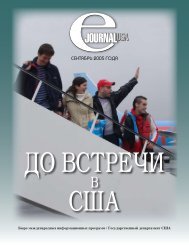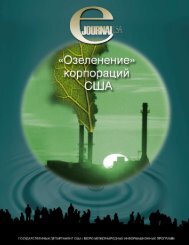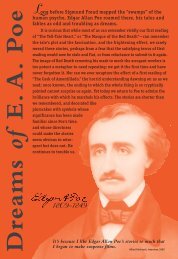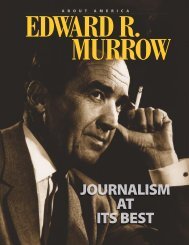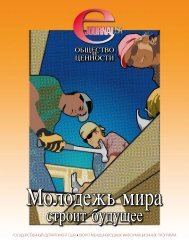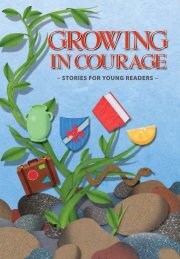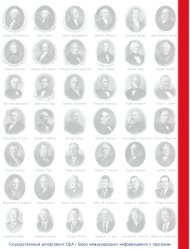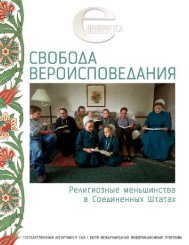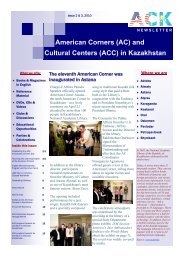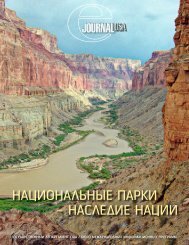AMERICAN
Outline of American Literature
Outline of American Literature
- No tags were found...
Create successful ePaper yourself
Turn your PDF publications into a flip-book with our unique Google optimized e-Paper software.
TRADITIONALISM<br />
Traditional writers include acknowledged<br />
masters of established forms and diction<br />
who wrote with a readily recognizable craft,<br />
often using rhyme or a set metrical pattern. Often<br />
they were from the U.S. eastern seaboard or the<br />
southern part of the country, and taught in colleges<br />
and universities. Richard Eberhart and<br />
Richard Wilbur; the older Fugitive poets John<br />
Crowe Ransom, Allen Tate, and Robert Penn<br />
Warren; such accomplished younger poets as<br />
John Hollander and Richard Howard; and the early<br />
Robert Lowell are examples. In the years after<br />
World War II, they became established and were<br />
frequently anthologized.<br />
The previous chapter discussed the refinement,<br />
respect for nature, and profoundly conservative<br />
values of the Fugitives. These qualities<br />
grace much poetry oriented to traditional modes.<br />
Traditionalist poets were generally precise, realistic,<br />
and witty; many, like Richard Wilbur (1921- ),<br />
were influenced by British metaphysical poets<br />
brought to favor by T.S. Eliot. Wilbur’s most<br />
famous poem, “A World Without Objects Is a<br />
Sensible Emptiness” (1950), takes its title from<br />
Thomas Traherne, a 17th-century English metaphysical<br />
poet. Its vivid opening illustrates the clarity<br />
some poets found within rhyme and formal<br />
regularity:<br />
The tall camels of the spirit<br />
Steer for their deserts, passing the last<br />
groves loud<br />
With the sawmill shrill of the locust, to the<br />
whole honey of the arid<br />
Sun. They are slow, proud...<br />
Traditional poets, unlike many experimentalists<br />
who distrusted “too poetic” diction, welcomed<br />
resounding poetic lines. Robert Penn Warren<br />
(1905-1989) ended one poem with the words: “To<br />
love so well the world that we may believe, in the<br />
end, in God.” Allen Tate (1899-1979) ended a<br />
poem: “Sentinel of the grave who counts us all!”<br />
Traditional poets also at times used a somewhat<br />
rhetorical diction of obsolete or odd words, using<br />
many adjectives (for example, “sepulchral owl”)<br />
and inversions, in which the natural, spoken word<br />
order of English is altered unnaturally. Sometimes<br />
the effect is noble, as in the line by Warren; other<br />
times, the poetry seems stilted and out of touch<br />
with real emotions, as in Tate’s line: “Fatuously<br />
touched the hems of the hierophants.”<br />
Occasionally, as in Hollander, Howard, and<br />
James Merrill (1926-1995), self-conscious diction<br />
combines with wit, puns, and literary allusions.<br />
Merrill, who was innovative in his urban themes,<br />
unrhymed lines, personal subjects, and light conversational<br />
tone, shares a witty habit with the traditionalists<br />
in “The Broken Heart” (1966), writing<br />
about a marriage as if it were a cocktail:<br />
Always that same old story —<br />
Father Time and Mother Earth,<br />
A marriage on the rocks.<br />
Obvious fluency and verbal pyrotechnics by<br />
some poets, including Merrill and John<br />
Ashbery, made them successful in traditional<br />
terms, although they redefined poetry in<br />
radically innovative ways. Stylistic gracefulness<br />
made some poets seem more traditional than<br />
they were, as in the case of Randall Jarrell (1914-<br />
1965) and A.R. Ammons (1926-2001). Ammons created<br />
intense dialogues between humanity and<br />
nature; Jarrell stepped into the trapped consciousness<br />
of the dispossessed — women, children,<br />
doomed soldiers, as in “The Death of the<br />
Ball Turret Gunner” (1945):<br />
From my mother’s sleep I fell into the State,<br />
And I hunched in its belly till my wet fur froze.<br />
Six miles from earth, loosed from its dream<br />
of life,<br />
I woke to black flak and the nightmare<br />
fighters.<br />
80




